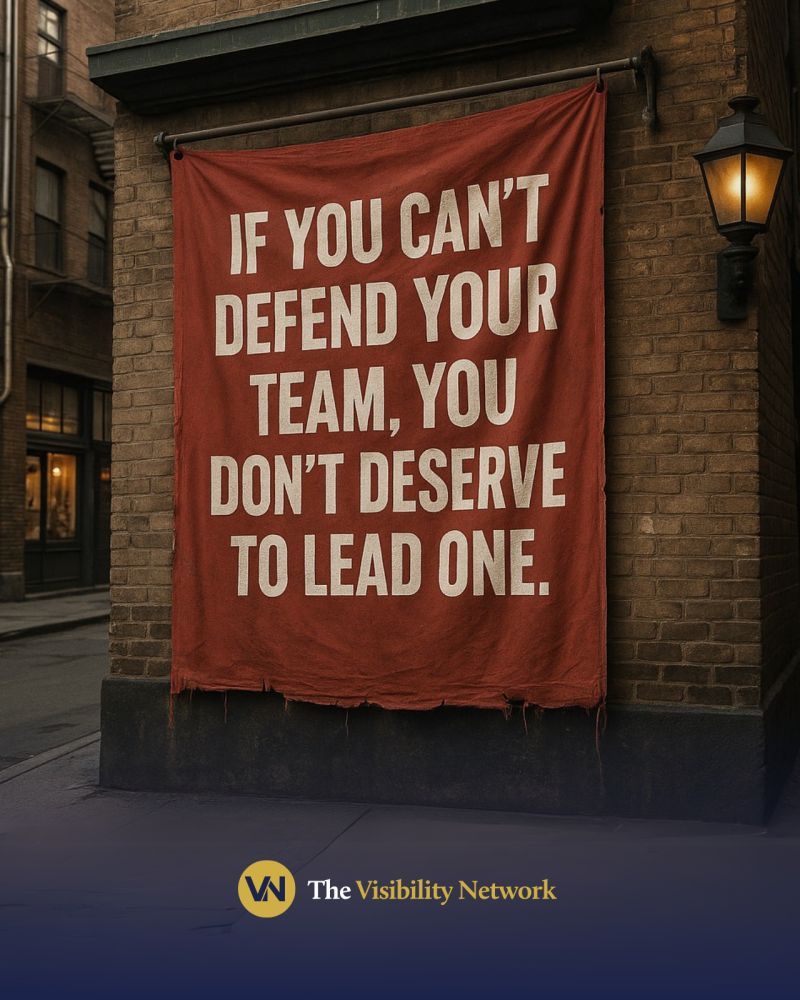Leadership isn’t about blindly defending your team—it’s about guiding them with truth, accountability, and growth. True leaders protect from injustice but also coach through failure to build maturity and resilience.
At-a-Glance
Key takeaways & how to apply the ASK Framework
Key Takeaways
- Defend with discernment. Protect people from injustice; don’t shield poor behavior.
- Develop self-leadership. Coach critical thinking, emotional maturity, and courageous humility.
- Multiply leaders, not dependence. Your legacy is how people act when you’re not in the room.
ASK Application (Align • Strengthen • Kickstart)
- Align: Stand up only when it aligns with truth, fairness, and values—not popularity.
- Strengthen: Build skill and character through feedback, reflection, and accountability.
- Kickstart: Empower people to advocate for themselves with maturity and respect.

The Problem With Feel-Good Leadership Quotes
The internet loves slogans that look great on walls but fall apart at work. This one is no exception. A good leader should protect the team—but protection has limits. If all you do is defend, you risk raising people who can’t handle feedback, accountability, or conflict. That’s dependence, not development.
For a deeper dive on this theme, see “Standing Up for the Team: A Popular Narrative That Lacks Depth”.
From Defending to Developing
Leadership requires wisdom to know when to protect and when to stretch. Yes—stand up when your people are unfairly blamed or under-supported. But when they stumble, let accountability refine them. When they face tough feedback, guide them through reflection—not rescue.
If you want to earn lasting respect, don’t always fight their battles; teach them to fight their own with integrity.
The Misunderstanding About “Deserve to Lead”
The quote implies leadership worthiness depends on being a shield. In reality, leaders deserve to lead when they: model accountability (not avoidance), develop competence (not dependency), and multiply leaders (not loyal followers). For the pitfalls of over-protective leadership, revisit “The Irony of Being Employee Champion”.
When Defense Turns Into Damage
Constantly defending someone who misses deadlines or refuses collaboration may feel supportive today but erodes team credibility tomorrow. Empathy without standards becomes a shield for mediocrity—and fuels resentment from those carrying the weight.
What Real Leadership Looks Like
- Protect when people are treated unjustly.
- Coach when they fall short.
- Challenge when they stagnate.
- Empower when they’re ready to fly.
See how strategy becomes daily behavior in “From Boardroom Strategy to Everyday Impact.”
The ASK Framework Lens
This principle sits inside the ASK Framework (Align–Strengthen–Kickstart):
- Align: Defend only when it aligns with fairness, truth, and shared values—not ego.
- Strengthen: Equip people to speak up, own choices, and bounce back from failure.
- Kickstart: Empower them to advocate for themselves and others with maturity.
Biblical Perspective on Accountable Leadership
Even Scripture teaches that genuine growth comes from refinement, not refuge. Leaders who overprotect rob their people of the sharpening that builds wisdom and resilience.
“As iron sharpens iron, so one person sharpens another.” — Proverbs 27:17 (NIV)
“No discipline seems pleasant at the time, but painful. Later on, however, it produces a harvest of righteousness and peace for those who have been trained by it.” — Hebrews 12:11 (NIV)
True leadership, therefore, allows discomfort when it leads to character. Correction, reflection, and accountability are not signs of harshness but of commitment to people’s long-term maturity.
Leadership Adulting: Faith–Work Integration
Scripture Focus
“As iron sharpens iron, so one person sharpens another.” — Proverbs 27:17 (NIV)
“No discipline seems pleasant at the time, but painful. Later on, however, it produces a harvest of righteousness and peace for those who have been trained by it.” — Hebrews 12:11 (NIV)
Reflection
Protecting people from unfair treatment is right. But shielding them from accountability stunts growth. God’s design for maturation includes sharpening and training. Mature leadership means discerning when to step in as a shield—and when to step back as a coach—so people learn courage, humility, and wisdom.
Prayer
Lord, give me discernment to defend what is just and courage to develop what is lacking. Teach me to lead with truth and grace—so the people I serve become wise, resilient, and ready to lead others. Amen.
Practice This Week (ASK)
- Align: Clarify one standard you will defend (fairness, truth) and one behavior you will no longer shield.
- Strengthen: Conduct a 15-minute “sharpening” conversation: feedback + next step + support.
- Kickstart: Delegate a small ownership area with outcomes and check-ins—no step-by-step instructions.
Journaling Prompt
Where have I been a shield out of comfort rather than conviction? What one conversation this week can I reframe from rescue to growth?
Final Thought
If you can’t defend your team when they’re right, you lack courage. But if you defend them even when they’re wrong, you lack discernment. Leadership requires both—the courage to stand up and the wisdom to stand back—because your job isn’t just to protect your team; it’s to prepare them to lead themselves.
I saw this line on LinkedIn: “If you can’t defend your team, you don’t deserve to lead one.”
It sounds noble, but leadership is not about blind defense; it’s about responsible development.
At-a-Glance
Key takeaways & how to apply the ASK Framework
Key Takeaways
- Defend with discernment. Protect people from injustice; don’t shield poor behavior.
- Develop self-leadership. Coach critical thinking, emotional maturity, and courageous humility.
- Multiply leaders, not dependence. Your legacy is how people act when you’re not in the room.
ASK Application (Align • Strengthen • Kickstart)
- Align: Stand up only when it aligns with truth, fairness, and values—not popularity.
- Strengthen: Build skill and character through feedback, reflection, and accountability.
- Kickstart: Empower people to advocate for themselves with maturity and respect.

The Problem With Feel-Good Leadership Quotes
The internet loves slogans that look great on walls but fall apart at work. This one is no exception. A good leader should protect the team—but protection has limits. If all you do is defend, you risk raising people who can’t handle feedback, accountability, or conflict. That’s dependence, not development.
For a deeper dive on this theme, see “Standing Up for the Team: A Popular Narrative That Lacks Depth”.
From Defending to Developing
Leadership requires wisdom to know when to protect and when to stretch. Yes—stand up when your people are unfairly blamed or under-supported. But when they stumble, let accountability refine them. When they face tough feedback, guide them through reflection—not rescue.
If you want to earn lasting respect, don’t always fight their battles; teach them to fight their own with integrity.
The Misunderstanding About “Deserve to Lead”
The quote implies leadership worthiness depends on being a shield. In reality, leaders deserve to lead when they: model accountability (not avoidance), develop competence (not dependency), and multiply leaders (not loyal followers). For the pitfalls of over-protective leadership, revisit “The Irony of Being Employee Champion”.
When Defense Turns Into Damage
Constantly defending someone who misses deadlines or refuses collaboration may feel supportive today but erodes team credibility tomorrow. Empathy without standards becomes a shield for mediocrity—and fuels resentment from those carrying the weight.
What Real Leadership Looks Like
- Protect when people are treated unjustly.
- Coach when they fall short.
- Challenge when they stagnate.
- Empower when they’re ready to fly.
See how strategy becomes daily behavior in “From Boardroom Strategy to Everyday Impact.”
💡 The ASK Takeaway
This insight reminds us that leadership is about accountability and growth — the very heart of our
ASK Framework — Align • Strengthen • Kickstart:
- Align with truth, fairness, and shared values — not popularity.
- Strengthen your team through feedback, reflection, and accountability.
- Kickstart growth by empowering people to advocate for themselves with maturity and integrity.
Protect when needed, coach when necessary, and empower always — that’s mature leadership.
Biblical Perspective on Accountable Leadership
Even Scripture teaches that genuine growth comes from refinement, not refuge. Leaders who overprotect rob their people of the sharpening that builds wisdom and resilience.
“As iron sharpens iron, so one person sharpens another.” — Proverbs 27:17 (NIV)
“No discipline seems pleasant at the time, but painful. Later on, however, it produces a harvest of righteousness and peace for those who have been trained by it.” — Hebrews 12:11 (NIV)
True leadership, therefore, allows discomfort when it leads to character. Correction, reflection, and accountability are not signs of harshness but of commitment to people’s long-term maturity.
Leadership Adulting: Faith–Work Integration
Scripture Focus
“As iron sharpens iron, so one person sharpens another.” — Proverbs 27:17 (NIV)
“No discipline seems pleasant at the time, but painful. Later on, however, it produces a harvest of righteousness and peace for those who have been trained by it.” — Hebrews 12:11 (NIV)
Reflection
Protecting people from unfair treatment is right. But shielding them from accountability stunts growth. God’s design for maturation includes sharpening and training. Mature leadership means discerning when to step in as a shield—and when to step back as a coach—so people learn courage, humility, and wisdom.
Prayer
Lord, give me discernment to defend what is just and courage to develop what is lacking. Teach me to lead with truth and grace—so the people I serve become wise, resilient, and ready to lead others. Amen.
Practice This Week (ASK)
- Align: Clarify one standard you will defend (fairness, truth) and one behavior you will no longer shield.
- Strengthen: Conduct a 15-minute “sharpening” conversation: feedback + next step + support.
- Kickstart: Delegate a small ownership area with outcomes and check-ins—no step-by-step instructions.
Journaling Prompt
Where have I been a shield out of comfort rather than conviction? What one conversation this week can I reframe from rescue to growth?
Final Thought
If you can’t defend your team when they’re right, you lack courage. But if you defend them even when they’re wrong, you lack discernment. Leadership requires both—the courage to stand up and the wisdom to stand back—because your job isn’t just to protect your team; it’s to prepare them to lead themselves.
It sounds noble, but leadership is not about blind defense; it’s about responsible development.
Frequently Asked Questions
Why isn’t defending your team always good leadership?
Blind defense can enable poor performance and prevent growth. True leadership protects people from unfair treatment while keeping accountability and development intact.
When should a leader defend their team?
Defend only when your team faces injustice or false blame. Leadership means standing for truth and fairness—not ego or popularity.
What should a leader do instead of constantly defending?
Coach, challenge, and empower your team to take responsibility. Encourage reflection, self-leadership, and emotional maturity instead of rescue.
How does the ASK Framework apply in this situation?
Align with truth and fairness, Strengthen through accountability and feedback, and Kickstart self-advocacy and resilience. Leadership maturity grows when we balance courage with discernment.
What’s the danger of overprotecting your team?
Constant defense erodes credibility and breeds dependency. Overprotection replaces empowerment with entitlement—hurting both leader and team in the long run.





